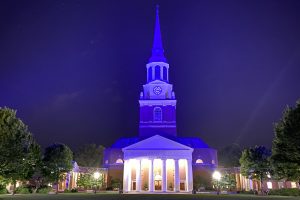
“Let every person be subject to the governing authorities; for there is no authority except from God, and those authorities that exist have been instituted by God” (Romans 13:1).
“Fallen, fallen is Babylon the great! It has become a dwelling place of demons, a haunt of every foul and hateful bird … for all the nations have drunk the wine of her fornication” (Revelation 18:2-3).
Context matters. History is important. Careful biblical interpretation is essential — especially for today’s world. Let’s take a closer look at these two pertinent passages above. Together, they provide bookends to probably the four most formative decades in early Christian Church.
Primarily, they illustrate a stark contrast in the early church’s understanding of political officials and the system those officials represented. The first from Romans calls upon Christians to “be subject to the governing authorities” saying clearly that those in power are placed there by God.
The second, however, offers an amazing change. No longer a call to respect those in office as officials “instituted by God,” Rome is now “Babylon.” This is a term of derision, followed by frightening imagery and scornful descriptions of wicked, rotting leadership disseminating widespread “wine of her fornication.”
Something has happened.
Today, this Romans passage is quoted by prominent preachers, even advisors to the current president, as justification for unyielding, unquestioning support. Evangelical, well-meaning Christian friends, neighbors and fellow church members hear Romans 13 and understand the meaning for what it appears to say. But context matters.
Paul probably composed Romans sometime between A.D. 57 and 58 during the reign of Nero (ruled 54-68). Revelation was composed probably between 93 and 95 during the reign of Domitian (81-96).
While Paul was preparing his letter to the Romans and advocating holy respect for ruling authorities, the Roman world was relatively calm. Paul’s primary concerns to this point had come from Jewish religious leaders arguing with him over the nature of Jesus, the primacy of the law and the status of Gentiles. Roman soldiers and government officials had often been his allies (he was a Roman citizen, after all, as were other early Christians like Silas).
Nero, for his part, had remained a kind of odd sideshow. He was narcissistic, immature, unconcerned with the broader world, unaware of what he didn’t know, incompetent, impulsive and mostly distracted in his early years of being emperor. He viewed himself as an artist, singer and composer. He wanted and got large crowds of “adoring” spectators. The subsequent rave reviews expected by Nero barely hid the truth. He was mediocre at best but so taken with pretended responses he began to broaden his exploits to athletic contests. We are told he won races he wasn’t even in. He reveled in the fawning, awards — and pretense.
Yet, up to the point when Paul composed Romans, Nero had been a strange, emperor-clown mostly laughed at behind his back. Few took him seriously. The wise and highly competent philosopher Seneca (who tutored Nero and ran the affairs of state from A.D. 54 to 65) was the real power behind the throne. And the empire was run by enough other competent officials, few needed to heed anything Nero thought or said. Life went on, the economy thrived and the Christian church continued to grow. Until everything changed.
It was in the summer of 64. Fire raged through Rome. Dry weather and hot winds carried embers, ash and flames over two thirds of the famous city. Countless lives, priceless works of art, vital historical documents and untold architectural wonders were lost in the conflagration. Suspicions leaned in the direction of Nero. His desire for expanding his palace fanned rumors. A quick move to construct the palatial “golden house” in an area close to where the fire began led many to believe he had the fire set as a prelude to his personal urban renewal. Anger grew. Nero, never one to admit to mistakes, quickly looked for distractions and for others to blame.
It was the Christians, he declared, this growing rabble of unpatriotic, potentially seditious underclass. Tacitus, the famous Roman historian, shares what came next:
Nero fastened the guilt and inflicted the most exquisite tortures on a class hated for their abominations, called “Chrestians” by the populace. … Accordingly, an arrest was first made of all who pleaded guilty; then, upon their information, an immense multitude was convicted, not so much of the crime of firing the city, as of hatred against mankind. Mockery of every sort was added to their deaths. Covered with the skins of beasts, they were torn by dogs and perished, or were nailed to crosses, or were doomed to the flames and burnt, to serve as a nightly illumination, when daylight had expired (Tacitus, Annals).
From these horrors, Christians understandably began to view the empire and those who ran it with far more concern. Though Nero’s persecution was localized to the areas right around Rome, the ramifications for Christians across the empire were profound. At the time of the fire, both Paul and Peter were in Rome. Both are believed to have been martyred soon after. Paul was beheaded. Peter was crucified upside down. Would Paul’s perspectives in Romans 13 have been different had they been written after 64? We’ll never know. But we do know history.
Nero was forced to commit suicide in 68. The oddities and tragedies of his bizarre reign eventually yielded to the more competent, professional leadership of Vespasian (ruled 69-79) and Titus (ruled 79-81). Both died natural deaths after successful reigns. Then came Titus’ brother, Vespasian’s other son, Domitian (ruled 81-96).
For Christians, Domitian becomes the new Nero, a chilling reminder of how quickly things can change. Narcissistic playboy emperors are no joke. They can quickly morph into wicked, demented rulers. Those early Christians concluded he and the broader empire might be controlled by “The Beast” so vividly described by John in Revelation.
In the years from Romans to Revelation, Christians came to understand the world differently than when Paul first wrote his hopeful words in Romans 13. Context remains vitally important. And so does our application of the Bible. Never should we use Romans 13 to acquiesce. When necessary, Christians can and must stand against imperial power. Taking scripture seriously, let us also learn from our history. May God give us wisdom.






































































